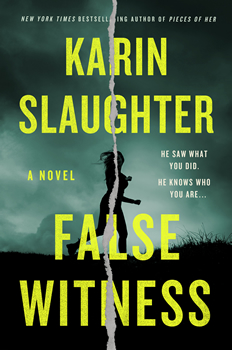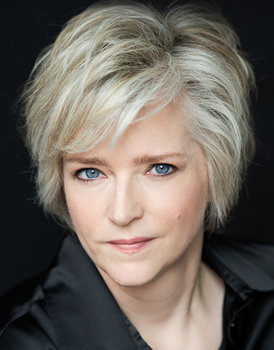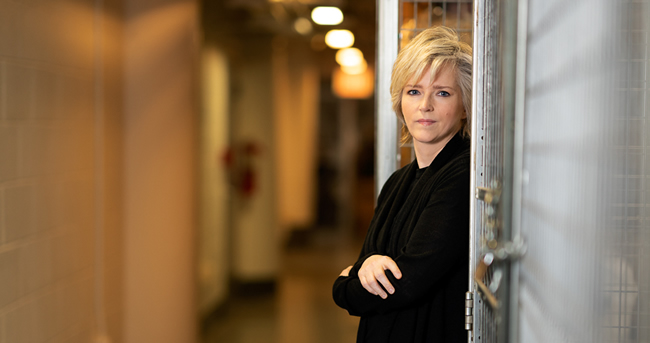

Up Close: Karin Slaughter
Capturing Tragedy in a Way Nonfiction Can’t
 By Dawn Ius
By Dawn Ius
Karin Slaughter recalls reading about the Spanish flu in high school—passages in textbooks that only skimmed the surface of a pandemic that killed 50 million people worldwide. It wasn’t until she read Katherine Anne Porter’s Pale Horse, Pale Rider, though, that she got a more visceral and emotional understanding of its devastating—and long-lasting—consequences.
The book, a fictional account of the author’s own struggle with the Spanish flu, detailed the disease’s grisly side effects—body temperatures so high that people’s hair turned white, skin that took on a purplish hue, financial insecurity, and so much more.
“All of that stuff is not what they teach about the pandemic,” Slaughter says. “What I read about in the textbooks didn’t impact me psychologically. But fiction can capture details in a way that nonfiction can’t—and shouldn’t. I wanted to talk about the fact that our hand sanitizer smells like tequila and that there are ‘maskholes’ who wear their mask below their nose. Look at the number of divorces in the past year, or the staggering number of kids who are going to lose out on a learning opportunity. I wanted to talk about all of that within the framework of a thriller.”
It wasn’t a decision she took lightly. Slaughter says she spoke to a number of authors at the start of COVID-19 to gauge how they planned to address the pandemic in their contemporary fiction. Most wanted to avoid it altogether.
“Mike Connelly was the only one who said he was going to include it,” Slaughter says. “And so I thought if Mike is going to do it, and he doesn’t catch shit for it, I’m going to do it too.”
The result is FALSE WITNESS, a novel with the life-changing impact of the past year and a half at its core. In traditional fashion, Slaughter gives readers a no-holds-barred view of humanity’s dark side as they navigate the pandemic and the issues it has brought to light. But of course, this is not a book about COVID-19, it’s a thriller—a Karin Slaughter thriller—and so fans know to brace themselves. FALSE WITNESS is a visceral, gut-wrenching page turner that will have you reading with one eye closed as she works to pry your eyes wide open.
The story is told through two different experiences—sisters Callie and Leigh have each dealt with a shared past trauma in their own way. Callie, an addict, likes to live life on the edge. And as someone who deals with COVID’s increasing death toll on a daily basis, it’s easy to see why she slips into old habits.
Leigh, on the other hand, leads a more privileged existence—she doesn’t lose her job, her kids continue going to school, even her split from her husband is amicable. She’s taking it all seriously, of course, but things are less…complicated for her. More removed from the day-to-day realities of the pandemic.
Though the sisters are estranged, they must work together when their past comes back to haunt them—and through their cracked lens, we are shown an unflinching view of how society, in so many ways, has degraded.
“One thing about the pandemic is that it’s brought to light so many things people are sick of and making us question why we continue putting up with this shit,” Slaughter says. “We are seeing the social inequities and how people are being treated in the justice system, for instance. And this has been a good way to talk about trauma, because at the heart of the story, and the pandemic, is trauma. We’re not going to know for decades how this will manifest itself.”
The ever-changing nature of the pandemic was one of the most challenging aspects of writing the novel, Slaughter admits. While she was able to capture the bigger details in a first draft, she had to go back (a few times) and revise as new information was released.
“I had to be the only person in the world that swore when the vaccines came out, because I knew I’d have to go back and incorporate them into the book,” she says, tongue firmly planted in cheek. “But I only had to look at history to predict what the responses would be. I understand hesitancy, but by now we should be able to process the information we’re given and reach some understandings about how to protect each other.”
Slaughter expertly weaves fact with fiction and lures us into her darkness, where long-time fans of her work will find familiarity, if not comfort. FALSE WITNESS is Slaughter’s 21st book, and arguably one of her most visceral and pulse-pounding.
“I always want to tell a different story every time,” she says. “To bring a different perspective to the things that all thrillers talk about—murder and violence.”
There’s no shortage of either in FALSE WITNESS, but it’s never gratuitous. Slaughter’s primary concern is always to do what is best for the story. Luckily, she’s had some experience in that regard.
“If this was my first book, I may have found it difficult not to include everything I researched,” she says. “But with this, I needed to be [disciplined] if I wanted to tell the best story.”
In that, there’s no question Slaughter has succeeded. Again.
- On the Cover: Alisa Lynn Valdés - March 31, 2023
- On the Cover: Melissa Cassera - March 31, 2023
- Behind the Scenes: From Book to Netflix - March 31, 2023



